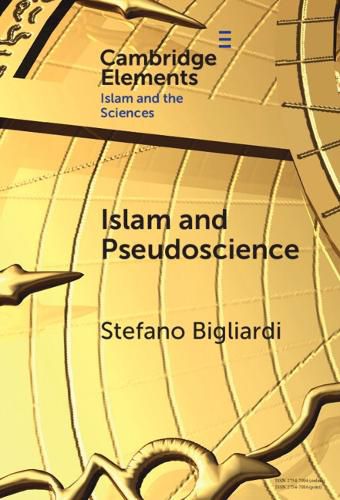Readings Newsletter
Become a Readings Member to make your shopping experience even easier.
Sign in or sign up for free!
You’re not far away from qualifying for FREE standard shipping within Australia
You’ve qualified for FREE standard shipping within Australia
The cart is loading…






Pseudoscience includes any practice or argument that is presented as scientific but systematically violates criteria that distinguish science, particularly experimental verification. This Element discusses, in critical fashion, different ideas and approaches that combine pseudoscience and Islam. It begins by historically reconstructing the debate on Islam-related pseudoscience developed by Muslim and non-Muslim critics. It then analyzes three areas which these critics have identified as pseudoscience: i?jaz ?ilmi or the "miraculous scientific content of the Qur'an"; Islamic creationism; ideas and approaches related to hygiene, nutrition, health, and illness. Each area is dissected, identifying the exact reasons that characterize some of its versions as pseudoscientific. After a section discussing other malpractices and erroneous approaches, which do not strictly qualify as pseudoscience but accompany and foster it, the Element ends with the discussion of overarching questions constituting an agenda for future discussions of Islam-related pseudoscience.
$9.00 standard shipping within Australia
FREE standard shipping within Australia for orders over $100.00
Express & International shipping calculated at checkout
Stock availability can be subject to change without notice. We recommend calling the shop or contacting our online team to check availability of low stock items. Please see our Shopping Online page for more details.
Pseudoscience includes any practice or argument that is presented as scientific but systematically violates criteria that distinguish science, particularly experimental verification. This Element discusses, in critical fashion, different ideas and approaches that combine pseudoscience and Islam. It begins by historically reconstructing the debate on Islam-related pseudoscience developed by Muslim and non-Muslim critics. It then analyzes three areas which these critics have identified as pseudoscience: i?jaz ?ilmi or the "miraculous scientific content of the Qur'an"; Islamic creationism; ideas and approaches related to hygiene, nutrition, health, and illness. Each area is dissected, identifying the exact reasons that characterize some of its versions as pseudoscientific. After a section discussing other malpractices and erroneous approaches, which do not strictly qualify as pseudoscience but accompany and foster it, the Element ends with the discussion of overarching questions constituting an agenda for future discussions of Islam-related pseudoscience.